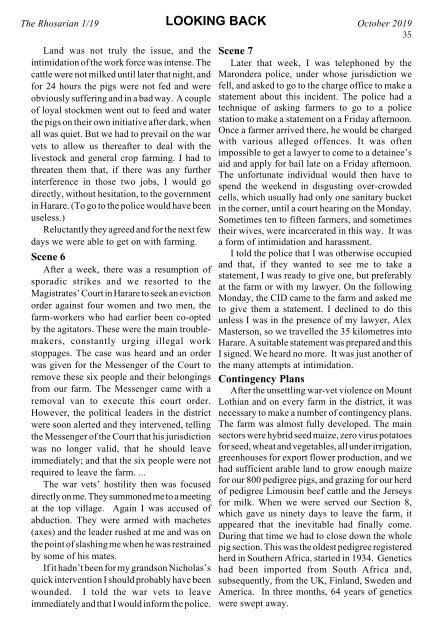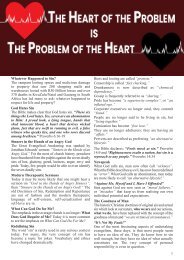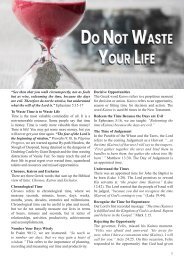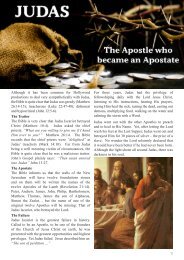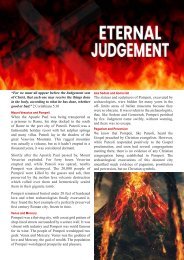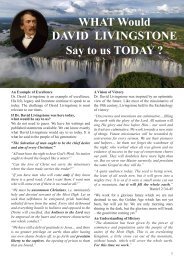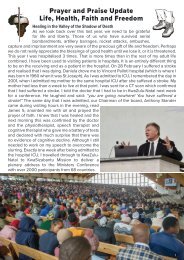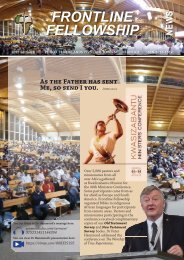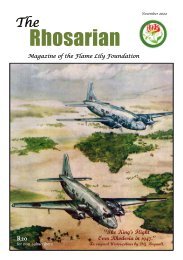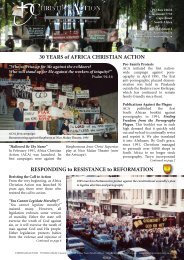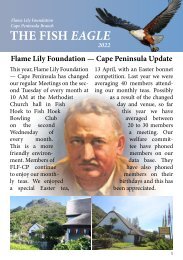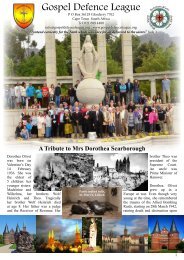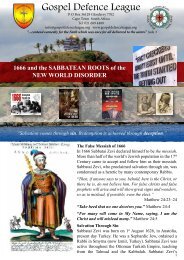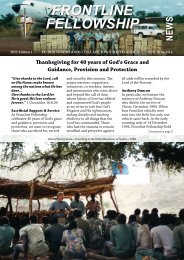Rhosarian 2019
Create successful ePaper yourself
Turn your PDF publications into a flip-book with our unique Google optimized e-Paper software.
The <strong>Rhosarian</strong> 1/19<br />
34<br />
whole village community - men, women and<br />
children - plus his own war vet contingent. He<br />
said that Mount Lothian was a very bad farm and<br />
that we treated our workers very badly, that Wendy<br />
and I were supporters of the opposition party, the<br />
MDC. He commanded five of our management<br />
team to step forward from the group of workers:<br />
our number one, Edward Hermes, the second-incommand,<br />
Magodi Mvula, and three others.<br />
They were told to sit down some way from the<br />
crowd and take their Shoes off. This had<br />
traditionally become the start of a season of<br />
violence and flogging, as we had learned from the<br />
terrorist war. After they had called Edward and<br />
questioned him before the crowd, when he<br />
courageously told the war vets that there was no<br />
substance to any of the charges they were making,<br />
they called Magodi. The same accusations were<br />
levelled at him and, because he was responsible<br />
for allocating work, he was regarded as an enemy<br />
of the workers. They said he had subjected the<br />
workers to unreasonable tasks. They said he was<br />
a womanizer and that he would have to leave the<br />
farm. By this time, passions were extremely<br />
inflamed by mob frenzy. Magodi was then told to<br />
lie down on the ground (all the war vets were<br />
armed with strong sticks) and they said he was<br />
going to be flogged. I stood beside him and spoke<br />
quietly and said that he had earned our loyalty and<br />
that he should not lie down and that I was not<br />
going to allow him to be beaten. We walked up to<br />
Kapesa and I told him exactly that. Then they<br />
started assaulting Magodi and beating him.<br />
Nicholas came to his aid and got soundly thrashed<br />
for his pains. They did not actually attack me but,<br />
after two or three minutes in the melee, they<br />
ceased hostilities.<br />
I admonished the war vets in Shona in the<br />
strongest possible words and told them that what<br />
they were doing was illegal and would be reported<br />
to the police and the authorities. Meanwhile, the<br />
police had arrived and became interested spectators<br />
only. The war vets urged us to go back to the house<br />
to discuss their grievances. We sat down on the<br />
lawn and started to talk. Shortly, a message came<br />
from the top village, where Magodi had his house,<br />
to say that a group of war vets and some of our<br />
own hostile women employees, who were enjoying<br />
the opportunity of venting their fury on one of our<br />
LOOKING BACK<br />
October <strong>2019</strong><br />
two senior managers, were looting his house.<br />
Magodi’s family had a pleasant threebedroomed<br />
home, which was well equipped with<br />
modern conveniences. The war vets were hurling<br />
the furniture, the beds, mattresses, his small electric<br />
stove, TV and refrigerator, and odds and ends on<br />
to the grass outside. Their actions were akin to a<br />
maddened swarm of bees. Magodi, his wife and<br />
small children were understandably terrified.<br />
The war vet leader said Magodi should leave<br />
the farm immediately and that if he was not gone<br />
by sunset they would take him and he would never<br />
be seen again. They said they knew where he lived<br />
and that other war vets would be watching him at<br />
his home in the rural area. Magodi asked me if he<br />
could have the use of one of our three-tonne farm<br />
trucks to take his goods, or what was left of what<br />
had been accumulated over years, to his home in<br />
the communal lands at Centenary. He and his<br />
family left the farm to threats or retribution if he<br />
was ever to return.<br />
We renewed contact with Magodi a week later,<br />
and for 18 months we met each month in Harare.<br />
We had undertaken to pay his salary until the<br />
madness subsided.<br />
It was rumoured widely enough to be believed<br />
that our ‘settler’, Matemachani had orchestrated<br />
the whole scene. It seemed that the plan was to<br />
take the farm from us and then to instil an<br />
atmosphere of fear and intimidation throughout<br />
the whole workforce to ensure compliance.<br />
The war vets dispersed. I spoke to our own<br />
employees and their families, told them that they<br />
had our complete support and that we were farmers,<br />
not politicians, that we were well known for the<br />
way in which we looked after our workforce and<br />
that they would be supported. The next day<br />
everybody was at work until lunchtime, when the<br />
agitators returned and co-opted six of our farmworkers.<br />
These people went around the farm<br />
telling workers to leave their jobs and go home.<br />
Scene 5<br />
Early next day the war vets returned in force<br />
and said that the farm was not to operate in any<br />
way. The pigs were not even to be fed or watered,<br />
the cows should not be milked, irrigation was to<br />
cease, and if anybody was found doing those jobs<br />
they would be severely punished.


